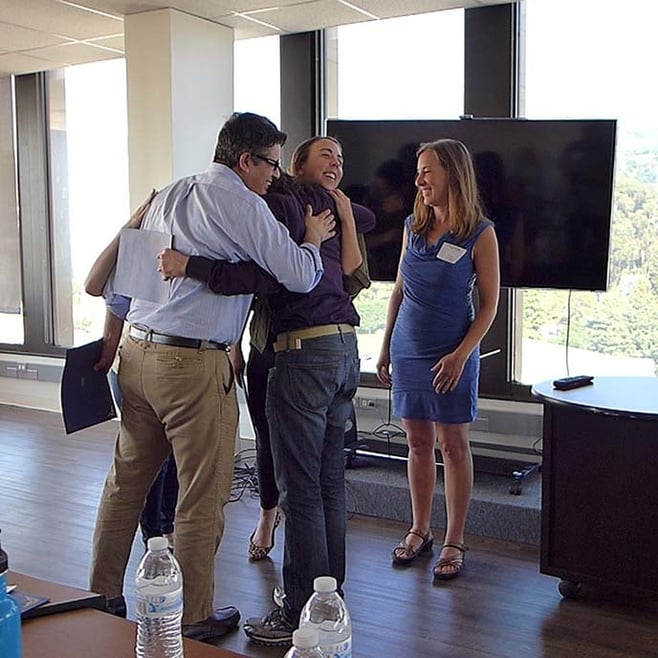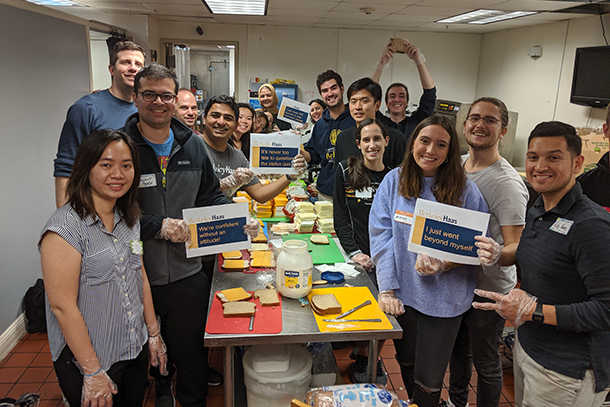Photo, left to right: Team members Michael Cohn, Jose Luis Pacheco, Faith Kirkpatrick, and Shannon Herline, with Lia Gaertner of the Bay Area Lyme Foundation
The first-ever hackathon to find innovative solutions to fight Lyme Disease—a potentially devastating tick-borne illness that infects some 329,000 people per year—took place at the Berkeley Haas Innovation Lab and Skydeck over the weekend of April 16 and 17. The winners were two Berkeley Haas MBA students, Faith Kirkpatrick and Shannon Herline, both EWMBA 18.
In June, they’ll move on to the three-day Lyme Innovation hackathon at the Microsoft Nerd Center in Cambridge, MA. The top five teams will take home seed funding, and will be invited to present their final projects at the Dean Center for Tick Borne Illness Research Consortium in September. At this final event, three top teams will be awarded grant funding to make their solutions a reality.
Here’s how they did it.
By Faith Kirkpatrick and Shannon Herline, both EWMBA 18
The team:
Our group consisted of two MBA students with direct experience with Lyme-disease patients and an understanding of the challenges of the disease. We also had Michael Cohn, a UX designer with a PhD in behavioral psychology, and Jose Luis Pacheco, a developer with a good understanding of EHS (environment, health & safety) systems.
Faith:
“This was my first hackathon. I was interested because my mom has had chronic lyme disease for the past 20 years. I thought I could bring my personal knowledge and Haas business skills to the table and get involved in something innovative in this often-overlooked chronic illness.”
Shannon:
“My focus in school is learning more about design thinking and innovation, so I’m always keeping an eye out for opportunities with the Berkeley Haas Entrepreneurship Program and the Haas Innovation Lab. When I saw they were hosting a hackathon for lyme disease, it hit a very personal note. My twin sister has been battling chronic lyme disease for the past two years and has found it incredibly difficult to navigate diagnosis and treatment given the complexities and controversy surrounding chronic or post-treatment lyme disease. My goal through this hackathon was to learn more about what she’s going through, and hopefully work with a team of smart people to make difference for others with chronic lyme.”
The field:
The first round of hackathons took place in Berkeley and at MIT. In Berkeley, there were about 15 participants making up four groups.
The problem:
Lyme Disease is very idiosyncratic: treatment is complex, and doctor-patient interactions are intermittent, making it difficult to identify which treatments are working and how.
Our solution:
We proposed a two-way mobile app for patients to track their symptoms daily and a website platform for doctors to track the symptoms alongside treatment programs. The app is clean and even fun to use. The website creates superior report visuals and is integrated with the doctor’s electronic health records system so doctors can see, in real time, what treatments their patients are undergoing and how they are reacting. Our goal is to overlay other data, such as your heart rate and sleep patterns from a smartwatch, onto this data as well.

The clincher:
We had a strong team, with a clear vision for a minimum viable product.
One of Berkeley Haas's four defining principles is "students always", which our team displayed strongly by speaking with our mentors and being willing to adapt our idea to the insights provided from many sources throughout the weekend. We also continuously questioned the viability of our idea, analyzed the strengths and weaknesses, and looked for areas to evolve. When time pressure was on, we pulled on skills learned in our core courses to craft our three-minute pitch, helping us clearly communicate both the vision and technical components of our solution.
Interested in innovation and entrepreneurship? The Berkeley Haas Entrepreneurship Program offers resources and support.









